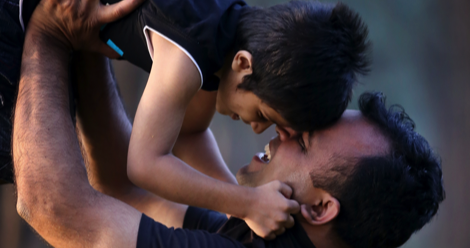
In Praise of Narrator Dads
A few weeks ago on NPR I heard an interview with a marine biologist who was asked how he first became interested in fish. “It was a divorced dad thing,” he said. Evidently his father “had it in his mind” that fishing is what dads do with their sons. But. Get this. His dad didn’t know anything about fishing. So they learned together. If I recall correctly, the biologist was only two when his parents split. I found the image of the young dad learning, well, how to be a dad with his tiny son, touching.
This story so delighted me that I only remember this bit, and not the actual reason for the interview.
I hadn’t realized that other parents also have these nebulous ideas about what parents do with their children. I sure did. For me, it was reading aloud—that’s just what you do. I don’t recall my own parents reading to me, so I’m not entirely sure how this idea was planted in my mind.
My ex-husband wasn’t read to, either. And, in fact, there weren’t many books in his home. But he got right on board with this bedtime-reading-aloud schtick, right from the beginning. We never discussed it. And we didn’t have the interwebs to tell us all the advantages of reading to your children. We just read.
And reading aloud did not come naturally or easily for my boys’ dad. He read haltingly, carefully. Whatever his challenges, they didn’t stop him. After the picture book years, he read the Little House series, most of the Hardy Boys, and the somewhat forgotten Ralph Moody books. I covered the Brits: C.S. Lewis, Arthur Ransome, and Rosemary Sutcliff.
Tallying the benefits of reading aloud seems a silly exercise. But there is one moment that stands out to me as relevant, suggestive. My older son was just shy of his tenth birthday in September 2001. I remember picking him up from school that day, the 11th, and tentatively broaching the subject. “You probably heard that some terrible things happened in our country.” I didn’t want to have that conversation. But he was totally game to talk about it and asked direct and surprising questions. He expressed concern about the families and firefighters, especially their children. Then immediately went into mystery-solving mode, wondering aloud about the logistics, how to find the perpetrators and exact justice.
This was when the menfolk were hard into The Hardy Boys. It sure seems like he had learned a kind of optimism, that no mystery, no problem, is unsolvable.
We know that is not true. Of course we know that. Heartbreakingly.
But we also know that patterns of thinking are established early in childhood and that stories make up the architecture of our identity.
As parents, we bring a world of spoken and unspoken assumptions about how the family structure is established and maintained.
Part of the reason I was so charmed with the marine biologist dad, I think, is this idea of the unquestioned assumptions about what it means to be family. There was an obvious benefit to that dad’s having it in his mind, that fishing is what you do—that boy became passionate and engaged enough in the subject to become an expert in his field.
Not all our unspoken narratives about what constitutes family and how parents parent are healthy or beneficial. We kinda just lucked out. And I’m sure glad that I had an awesome tag-team partner with the reading aloud.
















